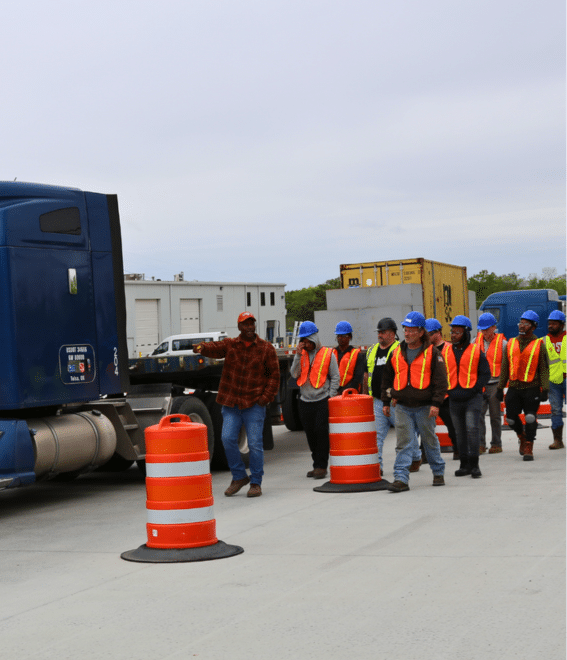
Jump-Start Your Truck Driving Career: A Complete CDL School Guide
If you’re ready to start your commercial driving career, your first step is going to be finding a CDL school that’s right for you. Choosing the right trucking school can set you up for success and will impact your career prospects once you graduate, so making an informed decision is paramount. In this blog, we’re providing a comprehensive guide on the questions you should ask yourself before enrolling, as well as qualities you should look for in a trucking school.
CDL School FAQs
How much is CDL school?
The typical cost for CDL school falls between $4,000 and $7,000 depending on the type of license, length of the course, prestige, and location of the school. This cost may be aided with loans, scholarships, or tuition reimbursement by an employer
How long is CDL school?
Most CDL schools are anywhere from three to six weeks in length. Some trucking companies require a certain number of hours of instruction in order to qualify.
Can you get a CDL at 18?
18 is the minimum age in order to enroll in CDL school, but you will have limited career opportunities. Drivers under 21 cannot cross state lines or transport hazardous materials, and many local jobs will require prior intrastate driving experience to qualify.
Do you need a diploma for CDL school?
While it’s not required by law that you need a high school diploma or equivalent to enroll in CDL school, most CDL schools and trucking employers will require either a diploma or GED to qualify.
What Are Your Trucking Career Goals?
Before you dive headfirst into the CDL school search, think about what type of driving you can see yourself doing. If you’re interested in driving large dry van or flatbed trucks, you’ll need to pursue a Class A CDL. This will involve the most schooling but provides the most career opportunities. If you’re leaning towards driving smaller vehicles like box trucks or delivery vans, you will need to obtain a Class B or C CDL, which will require a shorter CDL school program.
Once you’ve narrowed this down, the next step is research. If you’re unsure which CDL you’ll need for your preferred commercial driving job, check out our blog comparing Class A, Class B, and Class C CDLs.
What Qualities Should You Look For in a CDL School?
Accreditation: To ensure you’re attending a quality CDL school, you’ll want to know if the school is accredited by the FMCSA. This means it’s been confirmed that the school has met certain criteria and ensures you’ll be prepared for a trucking career. Also, double-check that the school meets your state’s requirements for your type of CDL.
Cost and Financial Aid: On top of the base cost for school, you may also need to factor in food and lodging, as well as the loss of income you take on if you’re at school during regular working hours. This makes it vital to look for schools with financial aid and scholarship programs. Some trucking companies also offer tuition reimbursement for new CDL graduates, which can help offset the cost.
Training Curriculum: What should a CDL school cover? It depends on the license type, but all programs should cover a mix of theoretical knowledge and practical skills. A thorough CDL school should cover traffic regulations, hours of service, basic truck maintenance, and safety rules as outlined by the EDLT (Entry-Level Driver Training) requirements set by the FMCSA.
You’ll also spend time in the truck practicing driving, backing, and other maneuvers you’ll encounter on the road, as well as pre-and post-trip inspections. All of this knowledge will be on your final exams that determine if you earn your CDL.

Equipment: You should be practicing on the vehicles you want to drive once you graduate. For example, if you’re planning on driving manual trucks, make sure the school you attend has some available. Modern, quality trucks will also provide the best training experience.
Job Placement Assistance: Finding a good career is the ultimate goal of CDL school, and a quality CDL school will be able to help you find the perfect fit. Consider whether the school partners with trucking employers that you’re interested in and ask about the school’s graduate employment rate. Some employers even offer their own CDL schools, ensuring you’ve secured a job offer as soon as you graduate.
Location and Schedule Flexibility: Everyone’s situation is different going into CDL school. Evaluate whether or not you need to travel to attend a quality CDL school, and if you’ll need to enroll somewhere that offers student lodging. If you want to keep working while in CDL school, make sure your school of choice offers part-time or weekend scheduling that aligns with your current hours.
Is Company-Sponsored CDL Training Worth It? Pros and Cons of Company Sponsored vs Private CDL School
Company-Sponsored CDL Training
- No money down to start CDL training
- Guaranteed job opportunity after graduating
- Learning specific requirements for the company helps you succeed
- Required to stay with the company for a year or more
- Have to pay for the value of your CDL training if you leave before your contract is up
- Less chances to explore options for your trucking career
Private CDL Training
- Education is not tailored to a single company
- Maximizes the number of potential career opportunities
- Can move on from a company if it’s not the right fit
- Tuition is not covered automatically
- No guarantee you’ll have a job offer once you graduate
No matter what commercial driving career you see yourself in, finding a great CDL school will make your transition into trucking much smoother. At Melton, we understand the hardships that come with starting a new career. If you’re looking for a place to start, view our list of the best truck driving schools by state here. We hire new CDL Class A graduates and offer up to $10,000 in tuition reimbursement for drivers who have been out of school for six months or less. Learn more about what it means to be a new CDL driver at Melton here.
